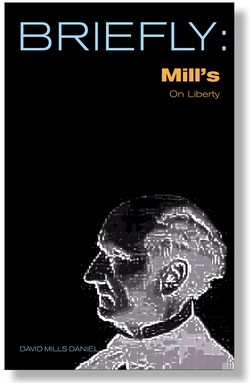Читать книгу Briefly: Mills' On Liberty - David Mills Daniel - Страница 9
На сайте Литреса книга снята с продажи.
ОглавлениеSome Issues to Consider
| • | Mill believed that individual and minority rights need protection in a democratic society, because the majority, whether by political oppression or the tyranny of public opinion, may seek to impose its views on individuals and minorities. |
| • | Mill proposed that his principle of individual liberty should regulate society’s control over the individual: the only purpose for which society may control the individual is to prevent harm to others or their interests. |
| • | Mill maintained that all matters relating to conscience and the expression and publication of opinion, including press freedom, fall within the region of individual freedom, and should not be restricted. |
| • | He thought that censorship harms society, not only by limiting freedom, but because a banned opinion may be true or contain some truth, or will challenge the accepted one and prevent it becoming a mere dogma. |
| • | Can a democratic society always make freedom of expression its paramount consideration, or are there some opinions it is entitled to prevent being expressed? |
| • | Mill urged those who engage in public debate to treat their opponents with respect, and not to misrepresent their views or attack their integrity. |
| • | Mill feared that people were too ready to have their views and way of life dictated to them by public opinion, and believed there should be more emphasis on individuality, which would encourage people to choose their way of life for themselves. |
| • | Was Mill right to think that all good and wise things come from individuals? |
| • | Do democratic governments tend to pander to their electorates, rather than providing leadership? |
| • | Mill defines a self-regarding action as one that affects only the individual. But is there really such a thing as a purely self-regarding action? And, even if there is, does this mean that society should not intervene to stop people doing things, which (it judges) will cause them harm? |
| • | Mill was opposed to state-provided education, because he feared it would become a means by which the state moulds people to become exactly the same, so preventing development of individuality. |
| • | Mill believed that, in general, people do things better, and become more responsible and self-reliant citizens, if they are left to do things for themselves. |
| • | Was Mill right to fear that expansion of state power and functions and an increase in the size of the state bureaucracy (civil service) would threaten individual freedom? |
